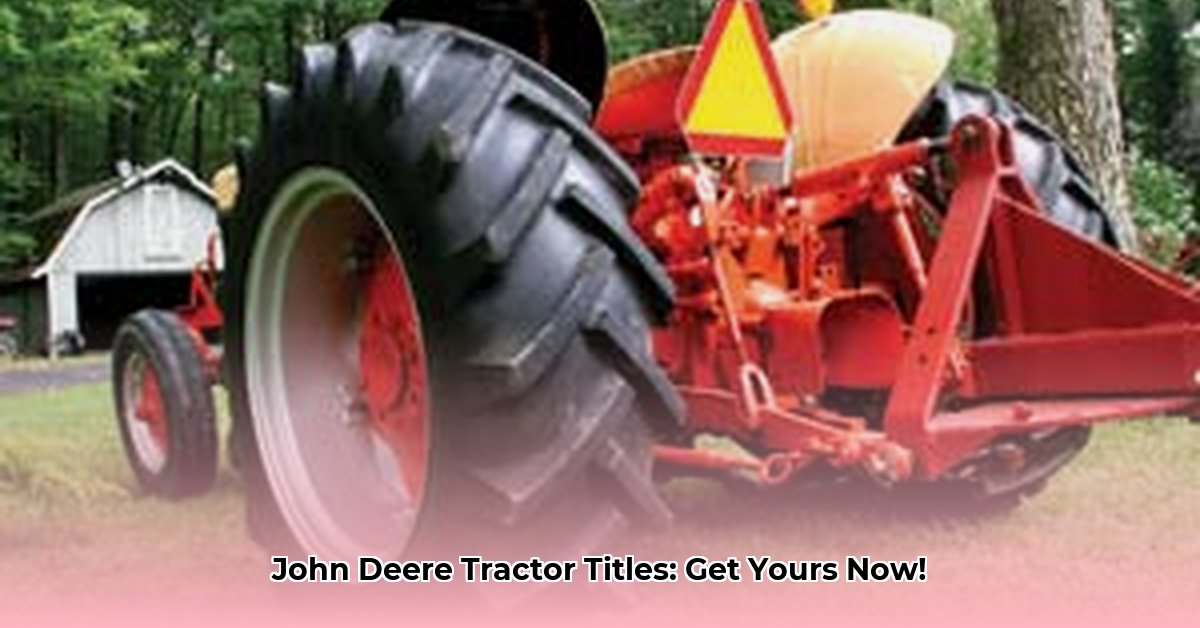
Understanding Tractor Ownership in the US
Buying or selling a John Deere tractor? Unlike cars, tractors don't always have titles, creating potential ownership issues. This guide provides clear steps to secure your ownership and avoid legal disputes. The absence of a universal titling system means you must rely on comprehensive documentation to protect your investment. This is especially crucial given the high value of a John Deere tractor. For more information on equipment warranties, see warranty information.
The Essential Documentation for Secure Ownership
Several key documents are essential to protect your interests when buying or selling a John Deere tractor. Proper documentation serves as your primary defense against future disputes.
1. The Comprehensive Bill of Sale: Your Foundation
A detailed bill of sale is your first line of defense. It should be far more than a simple handwritten receipt. It should include the following:
- Tractor Description: Make, model, year, color, and any unique identifying features (e.g., modifications or damage) (Accurate description protects against future questions about the tractor).
- Serial Number: The tractor's unique serial number must be precisely recorded. This allows you to verify its identity and history with John Deere. (Incorrect serial numbers can invalidate your claim)
- Purchase Price: The agreed-upon selling price, spelled out in both numerals and words. (Clear pricing reduces ambiguity).
- Parties Information: Complete contact information for both the buyer and seller (address, phone number, email address) (Allows for easy communication and confirmation).
- Date of Sale: The date the transaction occurred. (Tracks legal ownership claim).
- Signatures: Both parties—buyer and seller—must sign and date the document. (Legal binding agreement).
2. Serial Number Verification: Confirming Authenticity
Don't rely solely on the seller's information. Independently verify the tractor's serial number with John Deere directly. This step confirms the tractor's authenticity and checks against theft. (This safeguards your investment from unknowingly participating in fraud).
3. Lien Searches: Uncovering Hidden Claims
A lien is a financial claim on the tractor. Conduct a thorough lien search before buying the tractor. Methods vary by state; you may need to check with your local county clerk's office or utilize online services specializing in UCC (Uniform Commercial Code) filings. (Unidentified liens can result in seizure of your tractor).
4. Lien Release Letter: Clear Title Proof
If a lien exists, insist on a formal lien release letter from the lender before purchasing the tractor. This letter confirms the debt is paid off and the tractor is free and clear. (Failure to obtain this letter leaves you vulnerable to financial claims).
Best Practices For Buyers and Sellers
Buyer's Checklist: A Step-by-Step Guide to Secure Purchase
- Thorough Inspection: Inspect the tractor meticulously – consider bringing a mechanic for expert help.
- Document Verification: Verify all documents independently: check the serial number with John Deere, and confirm the bill of sale contains all necessary information.
- Lien Search: Perform lien searches as relevant to your state’s policies.
- Lien Release: Obtain a lien release letter if a lien exists.
- Secure Payment: Use a secure payment method (e.g., cashier's check, wire transfer) to avoid disputes.
- Seek Legal Advice: For high-value tractors, seek legal counsel to review documentation before purchase.
Seller's Checklist: Ensuring a Smooth Transaction
- Comprehensive Documentation: Provide buyers with a complete and accurate package of documentation, including a detailed bill of sale, photos, and any necessary lien releases.
- Clear Communication: Maintain open lines of communication with the buyer during the transaction to clearly address any questions or concerns before the exchange.
- Secure Payment: Choose a method that provides security and minimizes risks (cashier's checks or wire transfers are recommended).
- Record Keeping: Keep copies of all documentation for your records.
State-Specific Regulations: Know Your Local Laws
State laws governing tractor ownership and titling vary significantly. Always consult your state's Department of Motor Vehicles (DMV) or equivalent agency for specific requirements in your jurisdiction. Ignorance of state law is not a valid defense for ownership disputes.
Risk Assessment Matrix: Protecting Your Investment
| Documentation | Risk of Fraud/Theft | Risk of Legal Dispute |
|---|---|---|
| Bill of Sale Only | High | High |
| Bill of Sale + Serial Number Check | Medium | Medium |
| Complete Documentation Package (Bill of Sale, Serial Number Verification, Lien Search, Lien Release) | Low | Very Low |
This table highlights the importance of comprehensive documentation in minimizing risk.
Conclusion: Secure Your Tractor Ownership Today
While John Deere tractors might not always have titles, you can secure ownership through meticulous documentation and adherence to state regulations. The steps outlined here will significantly reduce the risk of disputes and protect your agricultural investment. Remember, when in doubt, seek professional legal advice.
Resources
[Insert links to relevant state DMV websites, legal resources for agricultural equipment, and John Deere resources for serial number verification]